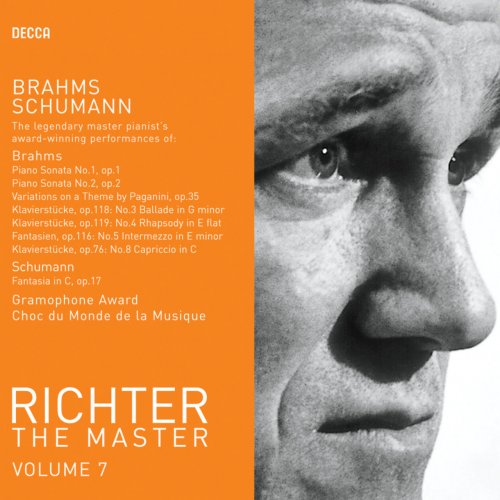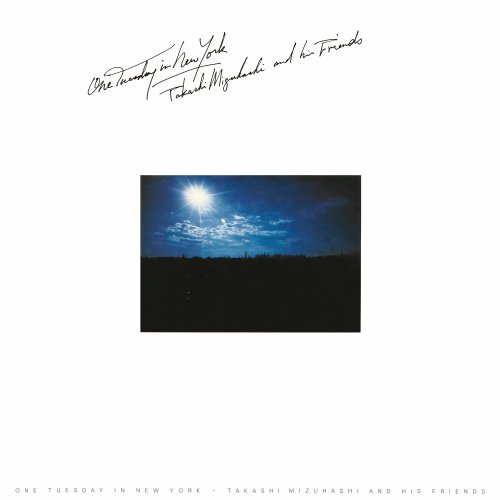Sviatoslav Richter - Richter The Master, Vol. 7: Brahms & Schumann (2007)

Artist: Sviatoslav Richter
Title: Richter The Master, Vol. 7: Brahms & Schumann
Year Of Release: 2007
Label: Decca
Genre: Classical
Quality: FLAC (tracks)
Total Time: 02:10:42
Total Size: 545 Mb
WebSite: Album Preview
Tracklist: Title: Richter The Master, Vol. 7: Brahms & Schumann
Year Of Release: 2007
Label: Decca
Genre: Classical
Quality: FLAC (tracks)
Total Time: 02:10:42
Total Size: 545 Mb
WebSite: Album Preview
CD 1
1. Brahms: Piano Sonata No.1 in C, Op.1 - 1. Allegro
2. Brahms: Piano Sonata No.1 in C, Op.1 - 2. Andante
3. Brahms: Piano Sonata No.1 in C, Op.1 - 3. Scherzo (Allegro molto e con fuoco)
4. Brahms: Piano Sonata No.1 in C, Op.1 - 4. Finale (Allegro con fuoco)
5. Brahms: Piano Sonata No.2 in F sharp minor, Op.2 - 1. Allegro non troppo, ma energico
6. Brahms: Piano Sonata No.2 in F sharp minor, Op.2 - 2. Andante con espressione
7. Brahms: Piano Sonata No.2 in F sharp minor, Op.2 - 3. Scherzo. Allegro
8. Brahms: Piano Sonata No.2 in F sharp minor, Op.2 - 4. Finale (Introduzione. Sostenuto - Allegro non troppo e rubato)
CD 2
1. Brahms: Variations on a Theme by Paganini, Op.35 - Book 1 - Book 1
2. Brahms: Variations on a Theme by Paganini, Op.35 - Book 1 - Book 2
3. Brahms: 6 Piano Pieces, Op.118 - 3. Ballade in G Minor
4. Brahms: 4 Piano Pieces, Op.119 - 4. Rhapsody in E Flat
5. Brahms: Fantasias (7 Piano Pieces), Op.116 - 5. Intermezzo in E Minor
6. Brahms: 8 Piano Pieces, Op.76 - 8. Capriccio in C
7. Schumann: Fantasie in C, Op.17 - 1. Durchaus fantastisch und leidenschaftlich vorzutragen - Im Legenden-Ton
8. Schumann: Fantasie in C, Op.17 - 2. Mäßig. Durchaus energisch - Etwas langsamer - Vielbewegter
9. Schumann: Fantasie in C, Op.17 - 3. Langsam getragen. Durchweg leise zu halten - Etwas bewegter
Performers:
Sviatoslav Richter, piano
First of all, the Brahms selections are among the finest in the entire Richter the Master series. As a glance at the online Richter discography discloses, the two sonata aren't the same readings as on a previous Decca release. Sonatas no. 1 and no. 2 are from the same recital in Tours, June 19, 1988, the year that the great man turned 73. The live recording is closely miked bu clear and full, and despite complaints about his hard touch, it's not anything beyond what we often hear from Richter; consult the more mercurial and restless Decca account for a fair comparison. In fact, it's short-sighted to fault any of Philips' recordings for sound quality given the often abysmal sonics on countless live concerts taped on the fly by amateurs, the Soviets, and various radio stations.
On the whole, both performances are less fierce and thorny than the Decca accounts, and in every way they surmount Brahms's technical demands with ease, showing not the slightest lapse of energy or concentration with age. There have been few Brahms interpreters to equal the spontaneous passion that is a Richter trademark. Even better are the two books of the Paganini Variations Op. 35, written in 1863 when the composer was thirty and the three early sonatas were a decade behind him, with the First Sym. more than a decade ahead (in no sense are they valedictory pieces as one reviewer here asserts).
Astoundingly, these immensely difficult studies in piano technique, based on the familiar 24th Caprice for violin of Paganini, were played on the same Tours program that yielded the two sonatas. One can understand the audience's wild enthusiasm at the end. I can't vouch for Richter's perfection of execution, but the performance is masterful and engrossing. He launches into every variation with a young man's enthusiasm. There is no other Richter account in his discography. The Brahms portion of this compilation is filled out with a handful of late works, including the Ballade in G minor from Op. 118 and the Rhapsody in E-flat from Op. 119, both given bold, authoritative readings with Richter in full sail. Finally there is the quieter Intermezzo in E minor from Op. 116, which he enlivens delicately in a rocking syncopated rhythm.
The Schumann portion contains one of six readings of the Fantasy in C that Richter left behind, this one the latest: Leverkusen, 17 Dec 1979. One can go on quite a snark hunt to find just the right combination of musicality, a good piano, and acceptable sound among all these choices. At his best, Richter was a supreme Schumann interpreter, but he could indulge in wayward playing, too much fierceness, and even banging. He lived by temperament. In this case, I find him a bit reserved and, in the opening movement, almost dull. From anyone else this Fantasy in C would be considered noteworthy, thanks to Richter's instinctual phrasing and his affinity for Romantic style. If you want a low-voltage version of his way with the piece, this one will fit the bill (be aware of some distracting finger slips, however). Personally, I would go for the clean transfer on Supraphon of his first recorded reading, from Prague on Nov. 2, 1959. Used copies of a previous release on Praga are often floating around at Amazon Marketplace.
All told, this is one of the best installments in the whole Decca/Philips series, and I can only hope that my review serves as an antidote to the peculiar ones that came before.
On the whole, both performances are less fierce and thorny than the Decca accounts, and in every way they surmount Brahms's technical demands with ease, showing not the slightest lapse of energy or concentration with age. There have been few Brahms interpreters to equal the spontaneous passion that is a Richter trademark. Even better are the two books of the Paganini Variations Op. 35, written in 1863 when the composer was thirty and the three early sonatas were a decade behind him, with the First Sym. more than a decade ahead (in no sense are they valedictory pieces as one reviewer here asserts).
Astoundingly, these immensely difficult studies in piano technique, based on the familiar 24th Caprice for violin of Paganini, were played on the same Tours program that yielded the two sonatas. One can understand the audience's wild enthusiasm at the end. I can't vouch for Richter's perfection of execution, but the performance is masterful and engrossing. He launches into every variation with a young man's enthusiasm. There is no other Richter account in his discography. The Brahms portion of this compilation is filled out with a handful of late works, including the Ballade in G minor from Op. 118 and the Rhapsody in E-flat from Op. 119, both given bold, authoritative readings with Richter in full sail. Finally there is the quieter Intermezzo in E minor from Op. 116, which he enlivens delicately in a rocking syncopated rhythm.
The Schumann portion contains one of six readings of the Fantasy in C that Richter left behind, this one the latest: Leverkusen, 17 Dec 1979. One can go on quite a snark hunt to find just the right combination of musicality, a good piano, and acceptable sound among all these choices. At his best, Richter was a supreme Schumann interpreter, but he could indulge in wayward playing, too much fierceness, and even banging. He lived by temperament. In this case, I find him a bit reserved and, in the opening movement, almost dull. From anyone else this Fantasy in C would be considered noteworthy, thanks to Richter's instinctual phrasing and his affinity for Romantic style. If you want a low-voltage version of his way with the piece, this one will fit the bill (be aware of some distracting finger slips, however). Personally, I would go for the clean transfer on Supraphon of his first recorded reading, from Prague on Nov. 2, 1959. Used copies of a previous release on Praga are often floating around at Amazon Marketplace.
All told, this is one of the best installments in the whole Decca/Philips series, and I can only hope that my review serves as an antidote to the peculiar ones that came before.
DOWNLOAD FROM ISRA.CLOUD
Sviatoslav Richter Richter The Master, Vol. 7 Brahms & Schumann 07 1402.rar - 545.5 MB
Sviatoslav Richter Richter The Master, Vol. 7 Brahms & Schumann 07 1402.rar - 545.5 MB

![Dimitri Nassar Trio - Dear Cleveland, Live at Treelawn Music Hall, Cleveland OH (2026) [Hi-Res] Dimitri Nassar Trio - Dear Cleveland, Live at Treelawn Music Hall, Cleveland OH (2026) [Hi-Res]](https://img.israbox.com/img/2026-01/25/qh0kick3gu9sz0xs3oycm9swu.jpg)

![Nabou - Indigo (2026) [Hi-Res] Nabou - Indigo (2026) [Hi-Res]](https://www.dibpic.com/uploads/posts/2026-01/1769524401_folder.jpg)




